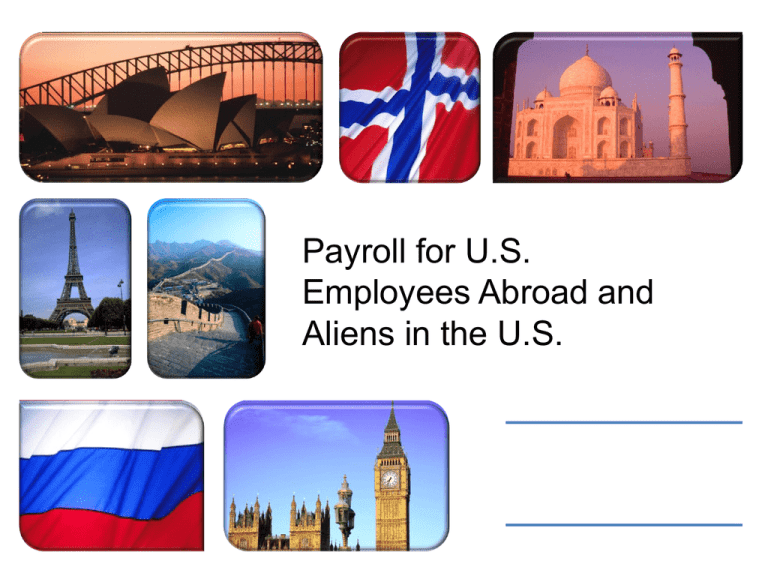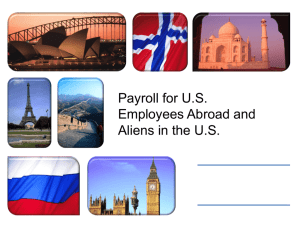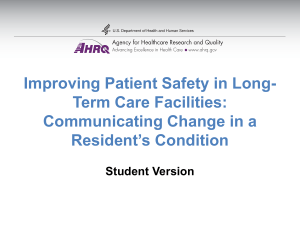Foreign Earned Income and Housing Cost Exclusion Business
advertisement

Payroll for U.S. Employees Abroad and Aliens in the U.S. Increase in global business increase in international assignments (both outbound and inbound) increase in the need of coordination among corporate departments (HR (Benefits), Legal, Payroll, Tax) How do international assignments affect all of these departments? Expatriate payroll administration is a set of activities that result in: an accurate delivery of compensation, benefits, and other policy-driven allowances in one or more currencies and compliant reporting and tax payments in one or more countries concurrently To effectively administer expatriate payroll, you’ll need a working familiarity with : Foreign payroll and tax law Domestic tax law regarding international transfers Tax treaty basics Expatriate policy Tax protection/equalization Intercompany accounting Foreign exchange concepts Tax Gross ups Totalization Home/Host Payroll; Shadow Payroll; Split Payroll The Making of an International Assignment 1. Expatriate Policy HR & Legal Allowances (Shipment of Goods, COLA, Hardship, Car, Schooling) 2. Foreign Assignment Agreement HR Secondment 3. 4. 5. 6. Immigration Insurance Salary, Expenses, Allowances Taxation HR HR (Benefits) Payroll Payroll & Tax Totalization, Tax Treaties, Hypothetical Tax Withholding Taxation How much does a typical expatriate assignment cost? Rule of thumb = 3 x the expat’s salary The majority of these costs are related to tax Successful tax planning can result in lower costs to the company Federal Income Tax Withholding Wages are generally subject to federal income tax withholding, however, there are certain exemptions applicable to US citizens Foreign earned income exclusion or housing cost exclusion Employers can choose to stop withholding federal income tax if the belief is that the wages will be excluded from the employee’s income under the foreign earned income or housing cost exclusion Employees must complete form 673 or equivalent created written statement attesting they meet either: bona fide residence test or physical presence test Federal Income Tax Withholding Wages subject for foreign income withholding If the employer is required by foreign law to withhold foreign income tax from the employee’s wages, the employer is not required to withhold US federal income tax The same is true for US possessions The withholding must be required by law Signed statement attesting to the foreign withholding should be kept on file by the employer Federal Income Tax Withholding Wages for work in U.S. possessions other than Puerto Rico Employer believes that 80% of work will be done in another U.S. possession—such as Guam, American Samoa & other islands Wages for work in Puerto Rico Bona fide resident of Puerto Rico for the entire year Extra withholding allowances for foreign tax credit Employees who expect to take a credit for foreign taxes paid on income not subject to the foreign earned income or housing cost exclusion can take extra allowances on their W-4 Filing and reporting rules still apply to expatriates, ie: must still provide employee with a timely W-2 Bona Fide Resident & Presence Test for US Possession Employee is considered a bona fide resident if: Is physically present in the possession for 183 days during the year Does not have a tax home outside the possession during the year & Does not have a closer connection to the U.S. or a foreign country than in the possession Presence test: Physically present in the possession at least 549 of preceding 3 year period (current and two previous), present at least 60 days each year Spend no more than 90 days in the U.S. during the year Sped more time in the possession than in US and do not have more than $3000 in U.S earned income No significant connection to the U.S. Social Security & Medicare Taxes • US Citizens and resident aliens working abroad generally pay Social Security/ Medicare tax which the company continues to match • Foreign earned income and housing cost exclusions do not apply to exempt an employee or employer from Social Security or Medicate tax • Employees working for foreign affiliate of US employer generally do not pay the SS/ MED unless opted by employer • Expatriate employees may also be subject to foreign social security tax Totalization Agreements Alleviates the double taxation for Social Security Temporary assignments , < 5 years are paid to US Permanent assignments > 5 years are paid to the foreign country Employer must obtain a Certificate of Coverage for the country where the employee will be assigned to establish that an employee’s wages are subject to US SS and Medicare taxes but exempt from foreign SS tax If employee is permanently working in the foreign country and will be exempt from US SS and Medicare tax, the employer must seek a Certificate of Coverage from the SS Official or agency of foreign country Certificates of Coverage remain with the employer US has agreements with: 24 Countries • • • • • • • • • • • Australia Austria Belgium Canada Chile Czech Republic Denmark Finland France Germany Greece • • • • • • • • • • • Ireland Italy Japan Luxembourg Netherlands Norway Poland Portugal South Korean Spain Sweden • Switzerland • United Kingdom Pending legislative adaptations: Mexico Foreign Affiliate Coverage Elections A foreign affiliate of a US employer can elect social security coverage for US citizens and resident aliens working there (otherwise they are not covered) A foreign affiliate is a foreign business entity in which a U.S. company has at least a 10% interest. The U.S. employer is responsible for paying both the employer and employee shares of the U.S. social security and Medicare taxes. The employer is not obligated to withhold or cause the foreign affiliate to withhold the employee share of the taxes from the employee’s wages, although the employee can agree to such withholding with the U.S. employer. Foreign Affiliate Coverage Elections The US must enter an agreement with the IRS through Form 2032 The IRS will assign the US employer a separate employer identification number for reporting wages and taxes covered by the agreement Employer must report wages and taxes on Form 941, annotating “3121(l)” agreement Heroes Earnings Assistance and Relief Act, a foreign employer is treated as an American employer for social security and Medicare tax purposes with respect to employees of the foreign employer performing services under a contract between the U.S. government and any member of any domestically "controlled group of entities" that includes the foreign employer. FUTA • Employment by US citizens working abroad for a US employer is covered under FUTA (Federal Unemployment Tax Act) if the work performed would be covered in the US • Does not apply to resident aliens working abroad or American employees of foreign affiliates • Coverage exception for Canada and Virgin Islands to avoid dual coverage for employees of US companies working where local unemployment exists • Employer must pay the full 6.2% FUTA for employees if the state having jurisdiction does not require employer unemployment insurance tax payments • No state payments = no credit against FUTA liability can be taken Foreign Earned Income and Housing Cost Exclusion • Expatriates can exclude the first $95,100 of foreign earned income from their gross income • Can also exclude certain housing costs from gross income • Must have foreign earned income, tax home must be in a foreign country & meet the bona fide residence or physical presence test Foreign Earned Income and Housing Cost Exclusion Foreign Country Any territory under the sovereignty of a government other than the US Territories and possessions of the US are not considered foreign countries, nor is Antarctica as a sovereign less region, nor are international waters and airspace Foreign Earned Income and Housing Cost Exclusion Foreign Tax Home Employees tax home must be in a foreign country for the entire period of residence or physical presence during the year Location of his or her regular place of business or employment If there is no regular or principle place of business, the employee’s tax home is where the employee regularly lives Cannot have a foreign tax home if employee regularly lives in the US Foreign Earned Income and Housing Cost Exclusion Foreign Tax Home -Is assignment temporary or indefinite ? Realistic expectation test If employment away from home in a single location is realistically expected to last (and does last) for one year or less, the employment = temporary If employment away from home is expected to last for more than one year or there is no realistic expectation that the employment will last for one year or less, the employment = indefinite (regardless of whether it actually exceeds a year) If employment away from home is realistically expected not to exceed one year, the employment = temporary until the date the expectation changes Foreign Earned Income and Housing Cost Exclusion Business Expenses Travel and living expense reimbursements for employees on temporary assignments may be excluded from income as reimbursed employee business expenses if the are provided under an accountable plan Bona Fide Residence Test Employees must prove that they have been bona fide residents of a foreign country for an uninterrupted period that includes at least one full taxable year (Jan-Dec) Considerations Family accompaniment Purchase of a home or a long term lease Involvement in culture and social life Terms of employment agreement Type of visa or residence permit *Employees can meet the bona fide resident of a foreign country even if the intent is to return to the US at the end of the international assignment *To claim bona fide resident status, Form 2555 must be filed Physical Presence Test Another way to qualify for the foreign earned income exclusion is by meeting the physical presence test met if the expatriate is physically present in a foreign country or countries for 330 full days during any consecutive 12-month period The 330 day qualifying days do not have to be consecutive, and all periods spent in foreign countries (personal and business) count Foreign Earned Income Earned by employee from sources within a foreign country, while employee has a foreign tax home and qualifies for the exclusion under the bona fide residence or physical presence test Includes wages, bonuses, cola, educational reimbursements, etc Does not include, pension or annuity payments, amounts already excluded as meals and lodging furnished for the employer’s convenience Determining the source of earned income Income earned for working in a foreign country; where or how the employee is paid has no bearing on the source of the income *Foreign earned income is considered to be income in the year it was earned, not in the year in which it is paid *Working spouses are also eligible to take exclusion Foreign Earned Income Calculation Partial year calculation for foreign earned income Number of days worked in the U.S. Total number of days worked X Total income = U.S. source income Example: 30 days worked in US 240 total days worked X 89,000 = US sourced income .125 X 89,000 = $11,125 Foreign earned income = $77,875 Foreign Housing Cost Exclusion • Employees who have a foreign tax home and qualify under the bona fide residence or physical presence test can take an exclusion for a limited amount of reasonable foreign housing expenses exceeding a base housing amount Reasonable housing expenses include : Reasonable housing expenses do not include: • • • • • • • • • Rent Utilities Insurance Occupancy taxes Fees to secure a lease Furniture rental Household repairs Automobile parking costs • • • • • • Lavish or extravagant expenses under the circumstances Telephone and cable television charges Deductible interest and taxes Capital expenditures, such as a house (including mortgage payments) Home improvements or furniture Cost of domestic labor (e.g., maids or gardeners) Foreign Housing Cost Exclusion • Base housing amount.- The base housing amount is 16% of the maximum foreign earned income exclusion, figured on a daily basis, multiplied by the number of days during the year the employee met the bona fide residence or physical presence test. The maximum foreign earned income exclusion is determined on January 1 of the year in which the employee’s tax year begins. • Housing cost exclusion limitation.- The reasonable housing expenses that are used to calculate the housing cost exclusion are limited to 30% of the maximum foreign earned income exclusion, figured on a daily basis, multiplied by the number of days during the year the employee met the bona fide residence or physical presence test. The maximum foreign earned income exclusion is determined on January 1 of the year in which the employee’s tax year begins. Foreign Housing Cost Exclusion Maximum Foreign Earned Housing Cost Exclusion Maximum Foreign Housing Income Exclusion Limitation Base Housing Amount Cost Exclusion 2011 $ 92,900.00 $ 27,870.00 $ 14,864.00 $ 13,006.00 2012 $ 95,100.00 $ 28,530.00 $ 15,216.00 $ 13,314.00 Example of calculation Foreign housing cost exclusion = reasonable housing expenses –base housing amount Base housing amount = maximum foreign earned income exclusion x 16% US Income Tax Treaties The US has more than 55 income tax treaties with foreign countries designed to clarify each country’s taxing jurisdiction and to avoid double taxation of income Some common treaty benefits: resident aliens working abroad is that the nondiscrimination clauses in most treaties allow them to qualify for the foreign earned income and housing cost exclusions under the bona fide residence test as well as the physical presence test An employee’s wages may be partially or totally exempt from taxation by the foreign country if the employee is in the foreign country for a limited number of days US Income Tax Treaties Wages received by professors and teachers in a treaty country are exempt from foreign taxes under most treaties for temporary periods up to 2 or 3 years Amounts received by US residents to study, research, or business and technical training are generally exempt from the treaty’s country income tax Provide for credits and deductions to reduce taxes imposed by the foreign country to avoid double taxation Tax saving clauses provide that treaties do not affect US taxation of its own citizens and residents therefore most treaties’ benefits related to a treaty country’s taxes are available only to US citizens who are not residents of the treaty country and US resident aliens who are not citizens of the treaty country Tax Reimbursement Policies To ensure that employees do not suffer in comparison to their US counterparts, most companies offer one or more additions to the expatriate’s basic compensation package: Housing allowance Shipment of household goods Education allowance Vacation allowance Hardship allowance Automobile allowance Cost of Living allowance Foreign service premium Tax Equalization- Tax Protection • Many employers follow a policy of Tax Equalization Tax Equalization is designed to ensure that the tax impact to an employee of taking an international assignment is neutral – the employee will pay no more or no less tax than they would have if they had remained in their home country. • Some employers follow a policy of Tax Protection Tax protection is designed to ensure that the employee pays no more tax than they would have paid had they remained in their home country; however, if the actual tax liability is less than what the employee would have paid had he/she remained in their home country, the employee retains the benefit. Tax Equalization Settlement Calculation • Many employers follow a policy of Tax Equalization Tax Equalization is designed to ensure that the tax impact to an employee of taking an international assignment is neutral – the employee will pay no more or no less tax than they would have if they had remained in their home country. • Some employers follow a policy of Tax Protection Tax protection is designed to ensure that the employee pays no more tax than they would have paid had they remained in their home country; however, if the actual tax liability is less than what the employee would have paid had he/she remained in their home country, the employee retains the benefit. Hypothetical Tax • Hypothetical tax represents the home country tax that the employee would have paid had he/she remained in the home country. • Hypothetical tax is typically withheld from the employee in lieu of actual tax (i.e., federal income tax). • In addition to hypothetical federal tax, the employer may take a hypothetical state tax depending on the terms of the international assignment and tax reimbursement policies. • Hypothetical tax is treated as a REDUCTION to earnings and reduces the federal and FICA/Medicare wages reported on an employee’s Form W-2. Expatriate State Tax Issues • State income taxes are imposed on all state residents based on total income, with the tax being federal adjusted gross income or taxable income • Nonresidents are taxed only on their income from state sources • The tax burden on expatriates will necessarily be less in most situations if they can show they are no longer state residents while on assignment • Domicile is a legal concept similar to residence, but it is distinct and turns on an individual’s attachments to the state Expatriate State Tax Issues The determination of residency is based on various tests depending on the state, but often depends on whether the expatriate remains a domiciliary of the state Determining Domicile • Where the employee votes • Where the employee maintains a residence • Where the employee’s immediately family lives and where children attend school • Whether the employee returns after vacations or other leaves from work • The state issuing the employee’s driver’s license • Where bank accounts and business associations are maintained The domicile is also considered the place the employee intends to return to upon completion of the international assignment Expatriate State Tax Issues Determining Residency Physical presence Where family lives and where children attend school Whether the employee works, has business interests, and owns property Where bank accounts and business interests are maintained For tax purposes State specific Nearly all states treat a domiciliary as a resident of the state for tax purposes Many treat nondomiciliaries as residents depending on how long they are in the state during the year and whether they have a permanent place of abode in the state A number of states treat domiciliaries as nonresidents for tax purposes if the are absent from the state for a certain period of time, even though they may intend to return Not all states allow for foreign earned income and housing cost exclusions Resident and Nonresident Aliens in US Resident aliens Taxed on worldwide income and are usually treated the same way as US citizens Nonresident aliens Taxed only on their income from US sources, with some exceptions An alien can be both a resident and non resident and be taxed as one or the other for part of the year Resident and Nonresident Aliens in US Lawful permanent residence test If an alien is a greencard holder, or lawful permanent resident of the US, he/she is considered to be a US resident for tax purposes and this would apply for the full year even if only physical present part of the year Substantial presence test If an alien is present in the US for at least 31 days during the entire calendar year and the total number of days of US presence during the current calendar year, plus one-third of the US days during the preceding calendar year, plus one-sixth of the US days during the second preceding calendar year is at least 183 days, he/she is considered to be a US resident for tax purposes Resident and Nonresident Aliens in US What is presence? When an alien is present in the US on any day in which he or she is physically present for any part of the day When are days present excludable? Full time employee of international organization or with diplomatic status In the US under student or traineee visa status, such as J-1, F-1, M-1, Q-1 Crew member of foreign vessel engaged in transportation between the US and a foreign country or US possession Medical condition which arose in the US Professional athlete to compete in charitable sporting event Days on which residents of Mexico and Canada regularly commute to the US to work and then return home Days spent in transit between 2 points in foreign countries during which the alien spends less than 24 hours in the US Resident Aliens Working in U. S. Wages subject to federal and state withholding and employment taxes Resident aliens must obtain a U.S. social security number Resident aliens must complete a Form W-4, Employee’s Withholding Allowance Certificate, and Form I-9, Employment Eligibility Verification Wages paid to and taxes withheld from resident aliens must be deposited and reported by the employer in the same way it does for all other employees, using Form 941 and Form W-2 Resident aliens working abroad generally treated as US citizens Nonresident Aliens Working in U. S. US sourced income is subject to federal and state withholding and employment taxes Nonresident aliens must obtain a U.S. social security number or ITIN (Individual Taxpayer Identification Number). Nonresident aliens must complete a Form W-4, Employee’s Withholding Allowance Certificate, and Form I-9, Employment Eligibility Verification. Wages paid to and taxes withheld from non resident aliens must be deposited and reported by the employer in the same way it does for all other employees, using Form 941 and Form W-2 Students, agricultural workers, work performed on foreign ships or plans, worked performed for the federal government are generally exempt from FICA and FUTA Commercial Travelers Exceptions to withholding rules The specific conditions that must be satisfied for this “commercial traveler” exception to apply are as follows: The nonresident alien employee is in the U.S. for no more than a total of 90 days during the taxable year; Compensation received for work performed in the U.S. totals no more than $3,000 during the taxable year; and The nonresident alien is employed by: a U.S. employer in a foreign country or a U.S. possession or by a foreign employer not engaged in a trade or business in the U.S. If the commercial traveler exception does not apply, the employer must withhold federal income tax Social Security & Medicare Taxes & FUTA Social Security, Medicare, & FUTA taxes generally apply to all wages paid for work performed in the US, regardless of citizenship or residency status of employee This is true even if the employee may be exempt from federal income tax but there are exceptions: Nonresident alien students (F-1, J-1, M-1, Q-1) Agricultural Workers Work performed on ships or planes Work performed for a foreign government Work performed for international organizations Depositing and Reporting Obligations In general, U.S. resident and nonresident aliens are subject to the same U.S. federal, state and unemployment tax reporting and withholding obligations as U.S. citizens/permanent residents Employees must be issued a W-2 Employers must report compensation and withhold federal, state, local and social tax (also state disability and unemployment taxes where required) using form 941 Employers must also fund the employer portion of FICA, Medicare, and federal and state unemployment taxes Amounts paid and taxes withheld from nonwage compensation must be reported on Form 1042 If withholding agent has 250 or more Form 1042 to file, it must do so electronically Types of Visas • Immigrant Visa – I-551 Permanent Resident Card (i.e., green card) Most common nonimmigrant visas include: • B-1: Visitors for business Students, workers or foreign press being paid by a foreign employer • H-1B: Professional and technical workers College-educated or experienced professionals D-1- Foreign Crewman Types of Visas • E-l - Treaty traders Traders in the U.S. only to carry on trade between the U.S. and the visa holder's home country • E-2 - Investors Foreign investors who are in the U.S. to direct a business in which they have invested or will invest a substantial amount of money. • E-3 - Specialty occupations Residents of Australia coming to the US. to work in specialty occupations, and their spouses and dependents. 10,500 annual limit Types of Visas • J-1: Exchange visitors Students, trainees, and teachers in the U.S. to participate in an exchange program Federal income tax withholding exemptions available Exempt from social wage reporting and withholding • F-1: Students Full-time students at an approved U.S. educational institution Federal income tax withholding exemptions available Exempt from social wage reporting and withholding Types of Visas • L-1 (A & B)- Intra company transfers Managers and executives in a specialized field of knowledge • M-1 – Non academic or vocational students • O-1 and O-2: Extraordinary Ability Extraordinary ability in the arts, sciences, education, or athletics • P-1- Entertainers, athletes • Q-1- Cultural exchange visitors • R-1 Religious occupations • TN-NAFTA-Canadians, Mexicans working under the North American Free Trade Agreement Form I-9 Where immigration and tax sometimes do not meet! Under IRCA, employer cannot require any new hire, (resident or nonresident) to produce any particular document, including a social security card However, E-Verify employers are required to obtain a SSN







